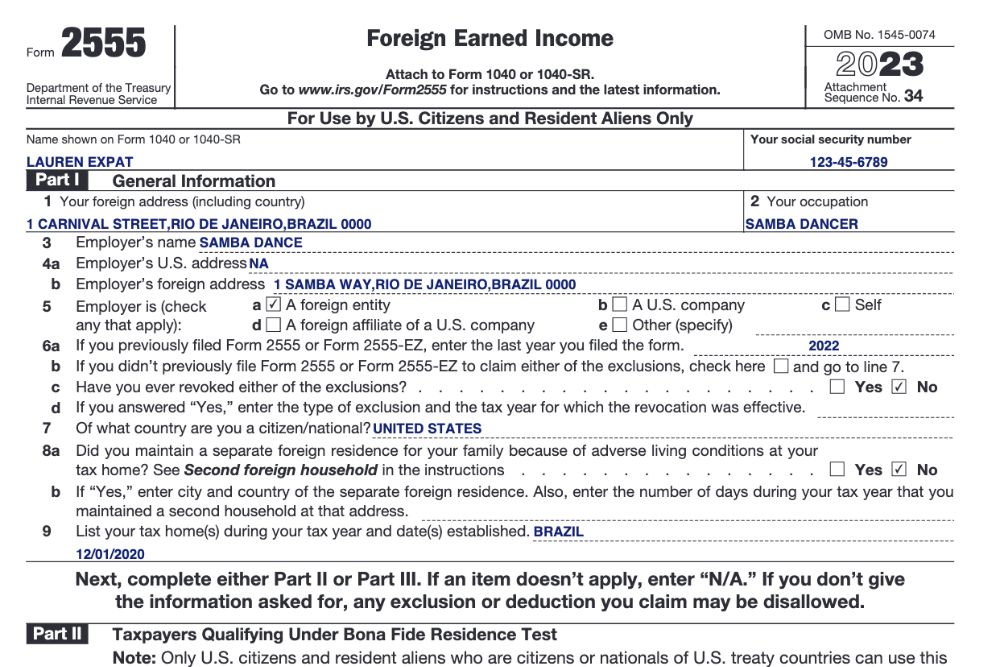The Foreign Earned Income Exclusion: A Complete Guide for Expats

- What Is the Foreign Earned Income Exclusion?
- Foreign Earned Income Exclusion (FEIE) Limit
- What Is Foreign Earned Income?
- How to Qualify for the Foreign Earned Income Exclusion
- Which Test Should I Use to Qualify for the FEIE?
- Using Form 2555 for Foreign Earned Income Exclusion
- Foreign Earned Income Exclusion Extensions
- Other Deductions and Exemptions for US Expats
- Common Foreign Earned Income Exclusion Mistakes
- Let Greenback Help You Save Money with Foreign Earned Income Exclusion
American expatriates can significantly reduce their US tax liabilities with the Foreign Earned Income Exclusion (FEIE). For 2023, the FEIE allows up to $120,000 of foreign income exclusion, contingent upon meeting specific tests like the physical presence or bona fide residence criteria. This comprehensive guide delves into essential FEIE details, addressing critical questions like its definition, eligibility criteria, and potential savings.
Key Takeaways
- Expats can use the Foreign Earned Tax Exclusion (FEIE) to exclude foreign income from US taxation.
- For the 2023 tax year, the maximum exclusion amount under the FEIE is $120,000.
- To qualify for the FEIE, you must meet the standards of the physical presence test or the bona fide residence test.
What Is the Foreign Earned Income Exclusion?
The Foreign Earned Income Exclusion (FEIE) is a tax benefit that expats can use to exclude foreign income from US taxation. The FEIE is designed to help expats avoid double taxation. Because your foreign income will likely be taxed in your country of residence, the FEIE protects you from paying taxes twice on the same income. However, there are limits to how much foreign income you can exclude using the FEIE.
Use our simple excel calculator to get an estimate of how the foreign earned income exclusion will save you money. It will make your day!

Foreign Earned Income Exclusion (FEIE) Limit
Every year, the FEIE exclusion amount is adjusted for inflation. For income earned in 2023, the FEIE maximum exclusion amount is $120,000 and has been set to increase to $126,500 for the 2024 tax year.
In the table below, you can see the FEIE exclusion amounts for every year since 2018.
| Tax Year | Foreign Earned Income Exclusion Amount |
| 2023 (filed in 2024) | $120,000 |
| 2022 (filed in 2023) | $112,000 |
| 2021 (filed in 2022) | $108,700 |
| 2020 (filed in 2021) | $107,600 |
| 2019 (filed in 2020) | $105,900 |
| 2018 (filed in 2019) | $103,900 |
What Is Foreign Earned Income?
The FEIE only allows you to exclude foreign earned income from your US expat taxes. This makes it important to understand which income qualifies as “earned” and “foreign.”
Earned vs. Passive Income
Earned income is any income you’ve earned by “working.” Income from wages and salaries are considered earned.
Passive income, on the other hand, includes interest, dividends, capital gains, rental property income, and retirement income. Passive income is not eligible to be excluded with the FEIE.
If you owe foreign taxes on your passive income—such as through a foreign capital gains tax—you can use the Foreign Tax Credit to reduce or eliminate your US tax bill from that income.
Foreign vs. US Earned Income
Generally, the IRS classifies income by where it is earned. If you are living and working abroad, then your income is considered to be foreign earned income, even if you are being paid by a US company.
The opposite is also true. If you are working in the US, your earnings are considered to be US earned income. This is true no matter who pays your salary, whether it is a US company or a foreign company.
How to Qualify for the Foreign Earned Income Exclusion
There are two tests that can determine whether you qualify for the FEIE, the physical presence test and the bona fide residence test.
1. The Physical Presence Test
The physical presence test is one way Americans living overseas can qualify for the FEIE and save money on their US tax return. To pass this test, all of the following must be true:
- You have foreign earned income
- You have a tax home in a foreign country
- You have been physically present in a foreign country for at least 330 days out of any 12-month period
The concept of a “tax home” is often misunderstood. A tax home is where an individual is permanently or indefinitely engaged in work—regardless of where their personal residence is. To quote the IRS: “Having a tax home in a given location does not necessarily mean that the given location is your residence or domicile for tax purposes.”
However, if you’ve retained a personal residence (abode) in the US, you can’t be considered to have a tax home in a foreign country. Your abode is determined by where you manage your personal, family, and economic ties. Where your family is can certainly play a role in determining your abode, but if you show that you’ve established a residence in your host country by integrating into society, having a home, and setting up a bank account, among other factors—your abode could be your host country.
2. The Bona Fide Residence Test
The alternative to qualifying with the physical presence test is by using the bona fide residence test. To pass this test, all of the following must be true:
- You have foreign earned income
- You have a tax home in a foreign country
- You have been a bona fide resident for a full tax year
The definition of a “bona fide resident” can be murky. The biggest factor here for passing the test is that you must demonstrate that you are permanently living abroad with no immediate plans to return to the US. This would include having a long-term lease or owning a home, having local bank accounts and utility bills, etc.
To learn more about bona fide residency, visit the IRS website.
Which Test Should I Use to Qualify for the FEIE?
Often, your specific situation will determine which test is the best option for qualifying for the FEIE. For instance, if you are on a foreign assignment with a specified end date (but for at least 330 full days), you’ll likely need to use the physical presence test.
On the other hand, if you moved to a foreign country with no intention of returning, you can probably use the bona fide residence test. (Other factors will also need to be considered while determining which test is right for you.)
Make sure to track your time abroad carefully. Both the physical presence test and bona fide residence test are based on how many days you spend outside of the US. If you aren’t overseas long enough—or you can’t prove where you were—it could cost you thousands of dollars on your US expat tax return!
Using Form 2555 for Foreign Earned Income Exclusion
You can claim the FEIE by filing Form 2555. To do this, you will need to know the following:
- Which test you are using to qualify (bona fide residence or physical presence)
- Dates you traveled internationally to/from the US during the tax year
- Your prior year Form 2555 (if available)
- Documentation of your foreign earned income
If you are filing with a spouse, both of you will have to complete your own Form 2555—even if you file a joint return.
Foreign Earned Income Exclusion Extensions
If you haven’t lived outside of the US long enough to claim the FEIE, you may be able to request an extension to file your expat taxes until you meet the time requirements. You will do this by filing IRS Form 2350.
For example, let’s say you moved abroad on October 1, 2023. On June 15, 2024 (the expat tax filing date), you will have lived overseas for only 258 days. That is not enough time to qualify for the FEIE under the Physical Presence Test.
By filing Form 2350, you can request a filing extension to September 30, 2024. This will allow the full 365 days to pass so that you can claim the FEIE on your expat tax return. You can then use the FEIE to exclude your foreign income beginning in October 2023.
Typically, you must claim the FEIE within one year of your tax return’s due date or by amending a timely filed return. However, there are exceptions. If the IRS hasn’t discovered your failure to file your return claiming the exclusion, or you owe no tax after taking the exclusion into account, you may still be able to claim the exclusion.
Even if you haven’t filed returns in prior years, you might still be able to exclude your foreign-earned income from US taxation. Doing so could eliminate your tax liability and prevent any penalties and interest that would be assessed.
Don’t let the fear of missing the FEIE deadline keep you from filing your expat taxes on time. Request an extension and speak with tax professionals to ensure you’re taking advantage of all available tax benefits.

Other Deductions and Exemptions for US Expats
In addition to the FEIE, the IRS offers several other tax benefits that expats can use to reduce or erase their US tax bill. Let’s look at a couple of the most common options.
1. Foreign Tax Credit vs. Foreign Earned Income Exclusion
The Foreign Tax Credit lets Americans offset their US tax bill based on taxes they’ve paid (or owe) to a foreign government. For example, if you paid $15,000 in foreign taxes, you could claim a $15,000 tax credit to offset your US tax bill.
If you live in a country with a higher income tax rate than the US, you may be able to erase your US tax bill entirely. However, the Foreign Tax Credit only applies to certain types of income, and there are unique considerations related to each foreign country. There is also a cap on how much you can claim each year.
You can claim both the Foreign Tax Credit and the FEIE in the same year, just not on the same income. It’s important to understand which option will help you save more based on your specific situation. Consult a tax professional to learn more.
2. Foreign Housing Exclusion
The Foreign Housing Exclusion lets you reduce your US taxable income by a portion of your qualifying housing expenses. Qualifying housing expenses typically include rent, utilities (except TV and internet), insurance, property taxes, and furniture rentals.
The specific amount of housing costs that you can exclude depends on the country and city in which you reside. Generally, if you live in a city with a higher cost of living, you can exclude a higher amount from your US expat taxes.
If you qualify for the FEIE, you are automatically eligible for the Foreign Housing Exclusion. You can claim both benefits by filing Form 2555.
Use this Foreign Housing Exclusion calculator to see how much you can save using the Foreign Housing Exclusion.
Common Foreign Earned Income Exclusion Mistakes
1. Thinking You Don’t Need to File a US Tax Return If You Qualify for the FEIE
Many expat taxpayers make the mistake of thinking that since their income is excludable from tax, they are not required to report income under the limit. This is incorrect! You must still file an annual Federal Tax Return and report your income. However, if you qualify for the FEIE, you can attach Form 2555 to your return and exclude your foreign income from US taxation.
If you are behind on your US tax filing obligations, don’t panic. You might be able to use the Streamlined Filing Compliance Procedures to catch up on your taxes without facing any penalties. (But don’t wait too long! If the IRS contacts you about your tax delinquency first, you may lose the privilege of this amnesty program.)
2. Failing to Prorate the FEIE When Needed
Under the physical presence test, you can qualify for the FEIE by being outside the US for 330 days out of any 12-month period. This period does not need to be the same as the tax year. For instance, you could qualify for the FEIE by living outside the US from April to April (rather than the tax year, which is January to December).
However, if you move abroad midyear, you will not be able to claim the full FEIE amount, which is intended for the full tax year. You will only be able to claim the portion of the FEIE that corresponds with the amount of time you spent abroad.
To figure out your maximum exclusion amount, simply multiply the maximum excludable amount for the year by the number of your qualifying days in the year. Then, divide that number by the number of days in the year.
For example, if you moved abroad in April 2023, you would calculate your FEIE amount for the 2023 tax year as follows: $120,000 (FEIE limit in 2023) x (274 days [number of qualifying days]) ÷ (365 [total number of days in the year]) = $90,082
3. When the FEIE May Cost You More
The FEIE can be a major benefit for Americans living abroad. However, the FEIE isn’t ideal for all expats. For example, if you have significant unearned income, earnings over the annual FEIE threshold, or live in a country with a higher income tax than the US, then the FEIE may not be the best choice. In such cases, alternative tax strategies—such as the Foreign Tax Credit—may be more helpful.
Once you choose the FEIE (and/or the Foreign Housing Exclusion), you must use it every year you have foreign earned income unless you formally revoke it. Once revoked, you cannot use the FEIE for another five years without requesting permission from the IRS in a Private Letter Ruling at the cost of $2,000. The IRS does not always grant permission, either.
There are times when expats benefit from revoking the FEIE. Expats often do this to use the Foreign Tax Credit to offset their US taxes instead of the FEIE. In these cases, the individual has typically moved permanently to a country with a higher tax rate than the US and earns more than the amount they can exclude with the FEIE.
It’s crucial to carefully assess your individual circumstances and seek guidance from a qualified tax professional service to determine if claiming the FEIE is the right choice for you.
The FEIE can be an excellent option for digital nomads. If you travel from country to country in short stints, you may be able to avoid paying foreign income taxes. Then, by meeting the physical presence test, you can exclude your foreign income from US taxation as well—resulting in very low income taxes—or none at all!
Let Greenback Help You Save Money with Foreign Earned Income Exclusion
The Foreign Earned Income Exclusion is a great tool for US expats to reduce their tax liability. If you’d like to learn more about how you can save on your expat taxes, our team of experts are standing by. At Greenback Expat Tax Services, we help Americans around the world file their taxes accurately and on time—while maximizing their savings.
Contact us, and we’ll be happy to help you in any way we can. We look forward to hearing from you!



